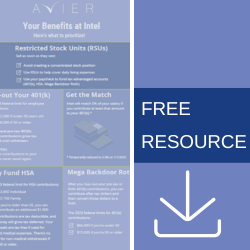Intel’s Compensation & Miscellaneous Benefits
Understanding Job Grades at Intel
How Employees at Intel are Paid
The average base salary at Intel is $134,000 with a sign-on bonus of $23,000 and $20,000 of stock bonus.
There are multiple ways employees are compensated at Intel:
- Base Salary
- Quarterly Profit Bonus (QPB)
- Annual Performance Bonus (APB)
- Stock Awards
The base salary is paid out twice a month. The annual performance bonus (APB) is paid annually in January based on the company’s financial performance in the prior year. Employees grades 2 through 6 have have APB goals of ~3.3%. For employees grade 7 and above, the APB is based on several individual and firm-wide performance-related factors. Besides the APB, Intel shares its profits with its employees via the Quarterly Profit Bonus (QPB). This bonus is equal to 5% of adjusted net income / cost of one day’s pay for all Intel employees.
Intel’s Restricted Stock Units (RSUs) and Grant Schedule
All full-time and part-time Intel employees are eligible for restricted stock units (stock grants), but they are not automatic. When deemed appropriate, Intel grants RSUs after an employee’s annual performance review. Typically these vest incrementally over a three-year period, creating a cascade of multiple stock awards over a time frame. In such circumstances, we encourage employees to live as much as possible from those vesting RSUs and and defer as of their salary as possible.
Below is an example grant delivery chart for new hires:
| New Hires by Quarter | RSU Grant Delivery Date |
| Quarter I | May |
| Quarter II | August |
| Quarter III | November |
| Quarter IV | February |
Intel’s Family Coverage
Intel updated its family leave benefits at the start of 2020. This plan has a number of components:
- New parents can now take up to 12 weeks to bond with a new child.
- New parents can work a part-time schedule for up to 4 weeks with full-time pay.
- Pregnant employees who can’t work can apply for short-term disability coverage for up to 12 months.
- Employees can take paid leave for up to eight weeks to care for a seriously ill family member.
- Employees who have lost a family member can take up to two weeks of bereavement leave.
Intel’s Health Benefits
To meet employee healthcare needs, Intel has created the Intel Corporation Health and Welfare Plan, which provides employees a range of medical coverage options from high-deductible plans to copay plans with Providence and Kaiser with high premiums.
For employees with a high-deductible plan, a Health Savings Account (HSA) provides an attractive strategy to save for future healthcare needs and reduce taxes. HSA funds can accumulate over the years and grow well past their original contributions and be tapped in retirement when medical costs are often higher. Similar to pre-tax contributions to a 401(k), HSA contributions are tax deductible and grow tax deferred. Unlike a traditional 401(k), however, deductions from the account are not taxable if used for healthcare expenses.
Intel’s Educational Benefits
Intel priorities professional development with the Intel Tuition Assistance Program (TAP), which provides financial assistance to eligible employees completed job-related programs and coursework. This is predicated on satisfactory job performance and good economic/business circumstances. If the employee has a job performance of “successful” or better, he or she is eligible for up to 100% of tuition assistance for eligible schools and programs. For graduate-level business programs, Intel covers up to $50,000 of tuition.
MORE INTEL INSIGHTS
For more information and advice from our Intel-focused advisors visit our other pages focused on Intel Compensation and Miscellaneous Benefits page, Intel SERPLUS, or Intel 401(k) & Retirement page.
READY TO GET STARTED?
Focused on your needs, we provide comprehensive financial planning and investment advisory strategies for individuals and families. We’d love to hear from you.
